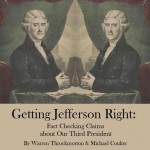Yesterday, like presidents before him, President Trump issued a proclamation commemorating Thomas Jefferson’s work in writing Virginia’s

Statute for Religious Freedom (full text here) which was adopted by the Virginia legislature on January 16, 1786. The law ended the establishment of the Anglican church in Virginia and recognized freedom of conscience in the state.
Jefferson meant for that freedom of conscience to extend beyond Christian denominations to all religions or none. However, ultra-conservative Liberty Counsel does not appear to recognize the breadth of Jefferson’s work. In their press release, the Statute on Religious Freedom is described as follows:
Religious Freedom Day is celebrated in America each year on January 16 to commemorate the 232nd anniversary of the passing of the 1786 passage of Thomas Jefferson’s Virginia Statute of Religious Freedom that ended the state-established church in Virginia, finally protecting religious rights for all denominations. The Anglicans had fined, persecuted, jailed and murdered Christians who were not part of the state-established church. However, Jefferson, a lifelong fervent advocate for the rights of religious liberty and religious conscience, worked hard to protect and defend those Christians. (emphasis added)
Liberty Counsel’s presser refers to denominations of Christianity and to Jefferson’s work to defend Christians. In the past, Liberty Counsel chairman Mat Staver has questioned the status of Islam as a religious worthy of First Amendment protection. Staver is also of the David Barton school of thought regarding the First Amendment — that the purpose of it was to prevent a Christian denomination from being established. In other words, when the First Amendment says religion, it means Christianity.
What Did Jefferson Mean?
In fact, there was an effort in the Virginia legislature to limit the scope of Virginia’s statute to Christians during debate on the bill. Jefferson wrote about it in his autobiography:
The bill for establishing religious freedom, the principles of which had, to a certain degree, been enacted before, I had drawn in all the latitude of reason & right. It still met with opposition; but, with some mutilations in the preamble, it was finally past; and a singular proposition proved that it’s protection of opinion was meant to be universal. Where the preamble declares that coercion is a departure from the plan of the holy author of our religion, an amendment was proposed, by inserting the word “Jesus Christ,” so that it should read “departure from the plan of Jesus Christ, the holy author of our religion” the insertion was rejected by a great majority, in proof that they meant to comprehend, within the mantle of it’s protection, the Jew and the Gentile, the Christian and Mahometan [Islam], the Hindoo, and infidel of every denomination.
According to Jefferson, the effort did not succeed. He meant his religious freedom bill to cover all people, of all religious ideas or no religious ideas.
What Religious Freedom Really Means Now
Ultimately, religious freedom at this particular time for this particular group means the freedom to discriminate against people, usually GLBT people in providing public services. In general, I think those who provide services to the public should provide them to GLBT people, even if they personally disagree with some aspect of those they serve.
But that’s just me and my beliefs. I know others believe differently, and the beauty of this nation is that they are free to believe it. What we will find out over the next few years is if they are free to discriminate based on that belief.
